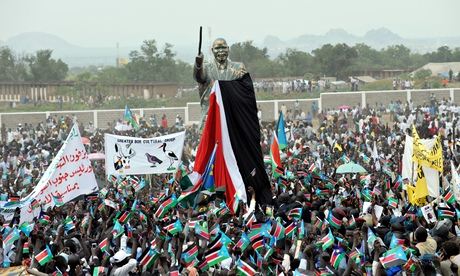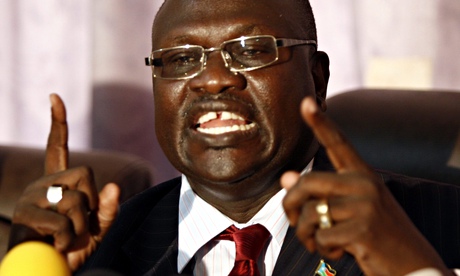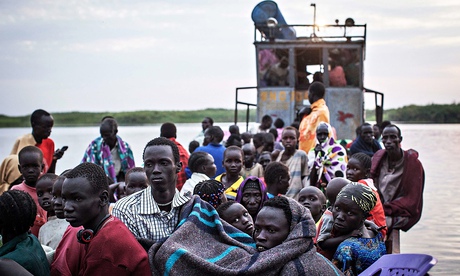In 2011, South Sudan was born on a wave of hope and promise. A little over two years later, civil war is tearing the country apart. What are the roots of the conflict – and can anything be done to halt the slide into chaos?
David Smith

The night before South Sudan, the world’s youngest country, was born, sculptor David Morbe worked until 11pm chiselling the finishing touches to his statue of the late father of the nation, John Garang. At the stroke of midnight he was among a cheering, dancing, singing throng as cars tooted horns, churches rang bells, fireworks lit up the night sky and a new clock tower announced: “Free at last.”
Later, watched by African leaders and foreign dignitaries, and with the help of Chinese engineers, the continent’s biggest country was cleaved in two as the flag of the oppressor, Sudan, was lowered and that of hopeful, liberated South Sudan raised. “At that moment, people were crying with joy and I had the same feeling in my heart,” says Morbe, 36. “It was a dream.”
Two-and-a-half years after independence day, the dream has curdled into a civil war in all but name. A battle of political egos has degenerated into an ethnic conflict that has killed many thousands of people. Tens of thousands more are huddled in squalid camps in fear for their lives. The UN says one month of fighting has set the country back a decade.
The national flag still flies and the 4m-tall statue of Garang still stands in a dusty field littered with bottles but, as the Guardian discovered, merely approaching it can result in brief military detention and the threat of 200 lashes from a cane. Disillusionment is palpable. “You can’t compare it with 2011,” Morbe reflects. “People were hoping for a better life, for development and construction, not this situation. My feeling is that we took the wrong step towards our new country. Now these ethnic clashes could make us a completely failed nation.”
Sculpting a new nation state was the work of many hands but if there was a Pygmalion, it was the United States, the prime sponsor of a referendum for secession, in which 99% voted yes, and the donor of billions of dollars in aid. South Sudan’s considerable oil reserves could be one motive. But it is now China, not the US, that dominates the oil sector.
There was another, post-9/11 factor. The Arab-led regime in Sudan had once harboured Osama bin Laden. The south’s breakaway benefited from an advocacy campaign in the US uniting Democrats, Republicans, African-American lobbyists, human rights activists and religious conservatives. There were those, such as Hollywood actor George Clooney, who looked through the prism of Sudanese president Omar al-Bashir’s alleged war crimes in Darfur. There were others, such as evangelist Billy Graham, who framed the Christian south’s 22-year war as a historic struggle against the Muslims of the north. It was a simplistic narrative that appeared to seduce Washington.

A crowd celebrates independence in July 2011, gathering around the statue of John Garang. Photograph: Roberto Schmidt/AFP/Getty Images
Edmund Yakani, a civil society activist and director of the independentCommunity Empowerment for Progress Organisation in the capital, Juba, says: “We travelled to New York and talked to UN ambassadors, including the US’s Susan Rice. We told them, please don’t ignore the frictions that were hidden due to the war for independence. But they thought about development and the economy taking off and said: ‘Let’s just throw money at it.’
“The voices urging governance were in the minority and neglected and not heard,” he says. “The media focused on development and service provision. Governance is the key challenge in South Sudan. After independence, we have not given ourselves time to look at it. We have not learned from the mistakes of Sudan.”
Little has been said by the US or UN about the failings of guerrilla commander-turned-president Salva Kiir since independence. Time, effort and money were squandered on a border dispute with Sudan. Communal violence resumed. The government failed to deliver; 38% of oil revenue was spent on military and security services, with just 10% going to infrastructure and 7% to education.
Less than a year after launch, Kiir himself could see a steady orbit had not been achieved. “We fought for freedom, justice and equality,” he wrote in an open letter to government officials, calculating that $4bn (£2.6bn) of public funds had been looted. “Yet, once we got to power, we forgot what we fought for and began to enrich ourselves at the expense of our people.”

South Sudan’s President Salva Kiir wipes his face during a news conference in Juba on 18 December. Photograph: Goran Tomasevic/Reuters
Peter Adwok Nyaba was higher education minister but says he could not get an audience with Kiir from July 2012 until his dismissal in July 2013. “Things were going wrong in the education system but I had a complete year of not being able to meet him,” says Nyaba, who has been under house arrest since Christmas Day. “Many people complained of the same thing. I think being president of the country is too big for him, which is showing itself in him being unable to take charge of the current situation. He’s just a village chief.”
Even the US president was reportedly given short shift. One aid agency official recalls: “Kiir treated Barack Obama like shit. The story goes they were supposed to meet at the UN in New York but Kiir kept him waiting for 20 or 30 minutes. People should have said this guy is not our friend.”
America is feeling buyer’s remorse, the source adds. “The people who were pushing the narrative South Sudan good, Sudan bad, are now calling out the South Sudanese government, but it’s too late. When a crisis like this breaks, the US’s leverage gets less and less.”
Kiir’s increasingly autocratic behaviour sowed division within his governing party, the Sudan People’s Liberation Movement (SPLM), struggling, like so many militant liberation movements before it, to transition to a political party. Last July, his vice-president, Riek Machar, a charismatic and ruthless former warlord once married to a British aid worker, openly defied him, telling the Guardian: “To avoid authoritarianism and dictatorship, it is better to change.” Machar and the rest of the cabinet were sacked three weeks later.

Riek Machar speaking during a press conference in 2011. Photograph: Philip Dhil/EPA
Nevertheless, Machar was content to ride the wave and subsequently accept leadership of a rebellion that quickly took on ugly ethnic dimension. Kiir is a Dinka, the biggest group, while Machar is a Nuer, the second most populous. Some say Kiir used the alleged coup attempt as a pretext to unleash his own private militia and, whether he intended it or not, Nuers were the victims. Machar, linked to a massacre of Dinkas in 1991, stands accused of stoking tribalism and mobilising a Nuer force known as the “white army”.
There is nothing inevitable about this, experts argue, noting that for most of their history Dinkas and Nuers have coexisted peacefully and inter-married. Indeed, five of 11 detainees accused of plotting against Kiir are Dinka, while there are Nuers in his government. Yet in villages across the country, where three in four people are illiterate, each group is feeding a spiral of paranoia about the other. Ivan Simonovic, the UN assistant secretary-general for human rights, warned in Juba last Friday: “There are completely different worldviews and narratives among communities. Truth is becoming ethnicised.”
Nowhere is this more evident than at the UN base in Juba, where more than 20,000 Nuers are crammed into about 45 acres, including young children, who can be seen defecating in the dirt, and heavily pregnant women. Many here believe the Nuer are the target of nothing less than ethnic cleansing and, officials say, some who have dared to venture beyond the gate in search of food and water have been murdered on sight.

Refugees fleeing the violence in Bor region cross the River Nile. Photograph: Nichole Sobecki/AFP
As peace talks in neighbouring Ethiopia go nowhere fast, many are gloomy about the prospects for peace in the short term and democracy in the long term. The conflict appears to be driving Kiir into the arms of Bashir and Uganda’s strongman president Yoweri Museveni, who is providing military support. The Americans are being spurned – described as “heartbreaking” for many senior officials who feel professionally and personally invested in the new nation.
But amid the atrocities on both sides there have been redemptive stories of Dinkas giving hunted Nuer families refuge in their homes and vice versa. No one interviewed by the Guardian believes that South Sudan was a mistake or regrets secession in those idealistic days of 2011. They do, however, blame the political elite. “Independence, with all its challenges, was the best thing that happened to this country,” insistsMading Ngor, a journalist and commentator. “I don’t know anyone who is looking for reunification with Sudan.
“There were a lot of emotional faces on independence day. People teared up when they saw the flag going up for the first time. There were youths running about celebrating the rise of a new nation: Dinka youths, Nuer youths. Now those youths are killing each other. There is a need for a new generation to accomplish what the politicians failed to do, which is to build. My hopes are pinned on the people of South Sudan. The future is always better.”

The burned bodies of two young men lie outside the hospital in Bor after the town’s recapture by government forces. Photograph: Reuters
by David Smith
Juba
Source: The Guardian

Leave a Reply